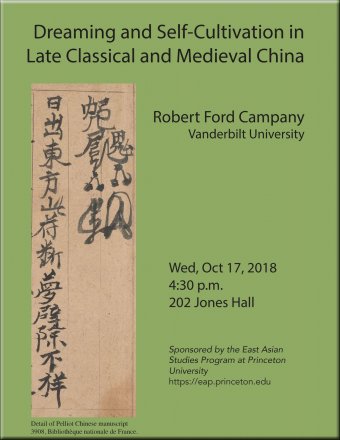

The Glorisun Global Network for Buddhist Studies @ UBC, with the administrative support from the UBC SSHRC partnership grant project FROGBEAR (From the Ground Up: Buddhism & East Asian Buddhism), proudly presents a lecture by Robert Ford Campany (Vanderbilt University)
When: Wed, Oct 17, 2018, 4:30 pm
Venue: 202 Jones, Princeton University
Abstract:
The Analects attributes a curious lament to its figure of Confucius: “How seriously I have declined! It has been so long since I last dreamed of the Duke of Zhou.” Already by the Western Han, then, there was the notion of a pipeline between one’s diurnal practice and one’s dream life. If you practiced some art, skill, or path of self-cultivation intently enough, you might continue the discipline while asleep, perhaps to be visited in dreams by those you seek to emulate.
Given the ubiquity of dreaming in human (and even some extra-human) experience, the makers of any thoroughgoing program for soteriological advancement or moral amelioration were going to have to address it in some fashion. How, then, was dreaming understood in each program, and what was the operative model of the dreaming self? What functions were dreaming enlisted to perform, and what risks was it understood to carry? I will discuss the relationship between dreaming and modes of self-cultivation (understood broadly) as portrayed in a variety of texts and genres in China from roughly 200 BCE to 800 CE. One thing I will show is that each distinct approach to dreams can be mapped across much of the religious and ideological spectrum: none is limited to a single “ism.” Another is that there was no single “Daoist” or “Buddhist” understanding of dreams. Rather than present a close reading of any given text, I will practice a sort of distant reading, threading textual examples weft-like across a simple six-strand warp structure: preventing dreams; filtering dreams (blocking nightmares, primarily); seeking dreams (incubation practices); transmission of teachings through dreams (dreams as revelatory of new scriptures or practices); “spilling over” (texts that picture dreaming as a field of experience in which one’s cultivational practices might carry over into one’s dream life, or vice versa, where a diagnostic dream is “tested” by events in waking life); and using dreams as diagnostic devices to indicate one’s progress on the path or to reveal hidden inner conditions needing to be addressed in practice.
As William James remarked in a very different setting, “The hubbub of the waking life might close a door which in the dreamy Subliminal might remain ajar or open.” Therein lay both dangers and opportunities, as we will see.
About the Speaker:
Robert Ford Campany is Professor of Asian Studies and Religious Studies at Vanderbilt University and author of, among others, A Garden of Marvels: Tales of Wonder from Early Medieval China (2015), Strange Writing: Anomaly Accounts in Early Medieval China (1996).
Click here to see the original event page.
